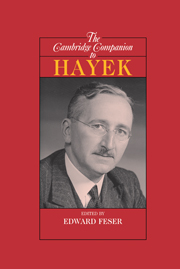Book contents
- Frontmatter
- Introduction
- 1 Hayek and the Austrian tradition
- 2 Hayek on money and the business cycle
- 3 Hayek and market socialism
- 4 Hayek and Marx
- 5 Hayek versus Keynes: the road to reconciliation
- 6 Hayek on knowledge, economics, and society
- 7 Hayek and Popper: the road to serfdom and the open society
- 8 Hayek’s politics
- 9 Hayek the philosopher of law
- 10 Hayek and liberalism
- 11 Hayek and conservatism
- 12 Hayek on the evolution of society and mind
- 13 Hayek on justice and the order of actions
- 14 Hayek the cognitive scientist and philosopher of mind
- Guide to Further reading
- Bibliography
- Index
8 - Hayek’s politics
Published online by Cambridge University Press: 28 January 2007
- Frontmatter
- Introduction
- 1 Hayek and the Austrian tradition
- 2 Hayek on money and the business cycle
- 3 Hayek and market socialism
- 4 Hayek and Marx
- 5 Hayek versus Keynes: the road to reconciliation
- 6 Hayek on knowledge, economics, and society
- 7 Hayek and Popper: the road to serfdom and the open society
- 8 Hayek’s politics
- 9 Hayek the philosopher of law
- 10 Hayek and liberalism
- 11 Hayek and conservatism
- 12 Hayek on the evolution of society and mind
- 13 Hayek on justice and the order of actions
- 14 Hayek the cognitive scientist and philosopher of mind
- Guide to Further reading
- Bibliography
- Index
Summary
In this chapter I offer a brief account of some central issues in Hayek's political thought, by way of discussing four important building blocks which play a role in their construction. I discuss several strands that go to make up his work, and some of the problems to which they give rise. I conclude with a suggestion about the relative priority that different themes might usefully be given, and with some remarks about the more narrowly political implications of Hayek's work. What are these different strands?
First, there are ideas stemming from the debate about economic calculation under socialism, and Hayek's related views concerning the use of knowledge in (commercial) society. Hayek thought that there was no alternative - for commercial societies - but to make use of price mechanisms, to aspects of whose significance he drew attention. At the same time, Hayek argued - for example, in his “Trend of Economic Thinking” ([1933] 1991) - that these also imposed certain constraints over what we might be able to accomplish, politically. This strand of argument - and its later extension into the claim that within such commercial societies the ideal of “social justice” is unrealizable - plays a significant role in his political thought.
- Type
- Chapter
- Information
- The Cambridge Companion to Hayek , pp. 148 - 170Publisher: Cambridge University PressPrint publication year: 2006
- 7
- Cited by

